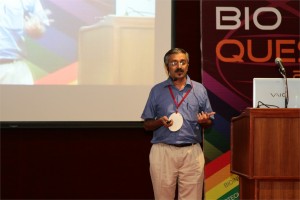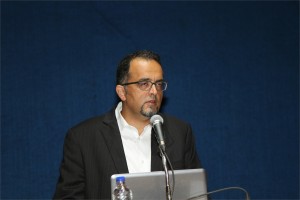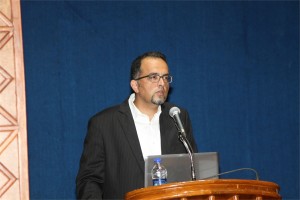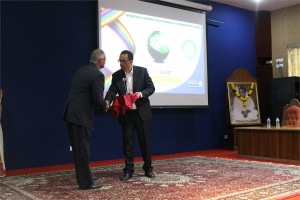Vural Özdemir Ph.D.
Sanjeeva Srivastava Ph.D.
 Krishnakumar Menon, Ph.D.
Krishnakumar Menon, Ph.D.
Associate Professor, Centre for Nanosciences & Molecular Medicine, Amrita University, Kochi, India
A Far-Western Clinical Proteomics Approach to Detect Molecules of Clinical and Pathological Significance in the Neurodegenerative Disease Multiple Sclerosis.
Multiple Sclerosis (MS), an autoimmune neurodegenerative disorder of the central nervous system. The disease affects young adults at their prime age leading to severe debilitation over several years. Despite advances in MS research, the cause of the disease remains elusive. Thus, our objective is to identify novel molecules of pathological and diagnostic significance important in the understanding, early diagnosis and treatment of MS. Biological fluids such as cerebrospinal fluid (CSF), that bathe the brain serve as a potential source for the identification of pathologically significant autoantibody reactivity in MS. In this regard, we report the development of an unbiased clinical proteomics approach for the detection of reactive CSF molecules that target brain proteins from patients with MS. Proteins of myelin and myelin-axolemmal complexes were separated by two-dimensional gel electrophoresis, blotted onto membranes and probed separately with biotinylated unprocessed CSF samples. Protein spots that reacted specifically to MS-CSF’s were further analyzed by matrix assisted laser desorption ionization-time-of-flight time-of-flight mass spectrometry. In addition to previously reported proteins found in MS, we have identified several additional molecules involved in mitochondrial and energy metabolism, myelin gene expression and/or cytoskeletal organization. Among these identified molecules, the cellular expression pattern of collapsin response mediator protein-2 and ubiquitin carboxy-terminal hydrolase L1 were investigated in human chronic-active MS lesions by immunohistochemistry. The observation that in multiple sclerosis lesions phosphorylated collapsin response mediator protein-2 was increased, whereas Ubiquitin carboxy-terminal hydrolase L1 was down-regulated, not only highlights the importance of these molecules in the pathology of this disease, but also illustrates the use of our approach in attempting to decipher the complex pathological processes leading to multiple sclerosis and other neurodegenerative diseases. Further, we show that in clinicaly isolated syndrome (CIS), we could identify important molecules that could serve as an early diagnostic biomarker in MS.
 Gokul Das, Ph.D.
Gokul Das, Ph.D.
Co-Director, Breast Disease Site Research Group, Roswell Park Cancer Institute, Buffalo, NY
Probing Estrogen Receptor−Tumor Suppressor p53 Interaction in Cancer: From Basic Research to Clinical Trial
Tumor suppressor p53 and estrogen receptor have opposite roles in the onset and progression of breast cancer. p53 responds to a variety of cellular of stresses by restricting the proliferation and survival of abnormal cells. Estrogen receptor plays an important role in normal mammary gland development and the preservation of adult mammary gland function; however, when deregulated it becomes abnormally pro-proliferative and greatly contributes to breast tumorigenesis. The biological actions of estrogens are mediated by two genetically distinct estrogen receptors (ERs): ER alpha and ER beta. In addition to its expression in several ER alpha-positive breast cancers and normal mammary cells, ER beta is usually present in ER alpha-negative cancers including triple-negative breast cancer. In spite of genetically being wild type, why p53 is functionally debilitated in breast cancer has remained unclear. Our recent finding that ER alpha binds directly to p53 and inhibits its function has provided a novel mechanism for inactivating genetically wild type p53 in human cancer. Using a combination of proliferation and apoptosis assays, RNAi technology, quantitative chromatin immunoprecipitation (qChIP), and quantitative real-time PCR (qRT-PCR), in situ proximity ligation assay (PLA), and protein expression analysis in patient tissue micro array (TMA), we have demonstrated binding of ER alpha to p53 and have delineated the domains on both the proteins necessary for the interaction. Importantly, ionizing radiation inhibits the ER-p53 interaction in vivo both in human cancer cells and human breast tumor xenografts in mice. In addition, antiestrogenstamoxifen and faslodex/fulvestrant (ICI 182780) disrupt the ER-p53 interaction and counteract the repressive effect of ER alpha on p53, whereas 17β-estradiol (E2) enhances the interaction. Intriguingly, E2 has diametrically opposite effects on corepressor recruitment to a p53-target gene promoter versus a prototypic ERE-containing promoter. Thus, we have uncovered a novel mechanism by which estrogen could be providing a strong proliferative advantage to cells by dual mechanisms: enhancing expression of ERE-containing pro-proliferative genes while at the same time inhibiting transcription of p53-dependent anti-proliferative genes. Consistently, ER alpha enhances cell cycle progression and inhibits apoptosis of breast cancer cells. Correlating with these observations, our retrospective clinical study shows that presence of wild type p53 in ER-positive breast tumors is associated with better response to tamoxifen therapy. These data suggest ER alpha-p53 interaction could be one of the mechanisms underlying resistance to tamoxifen therapy, a major clinical challenge encountered in breast cancer patients. We have launched a prospective clinical trial to analyze ER-p53 interaction in breast cancer patient tumors at Roswell Park Cancer Institute. Our more recent finding that ER beta has opposite functions depending on the mutational status of p53 in breast cancer cells is significant in understanding the hard-to-treat triple-negative breast cancer and in developing novel therapeutic strategies against it. Our integrated approach to analyze ER-p53 interaction at the basic, translational, and clinical research levels has major implications in the diagnosis, prognosis, and treatment of breast cancer.
 Vural Özdemir, MD, Ph.D., DABCP
Vural Özdemir, MD, Ph.D., DABCP
Co-Founder, DELSA Global, Seattle, WA, USA
Crowd-Funded Micro-Grants to Link Biotechnology and “Big Data” R&D to Life Sciences Innovation in India
Vural Özdemir, MD, PhD, DABCP1,2*
- Data-Enabled Life Sciences Alliance International (DELSA Global), Seattle, WA 98101, USA;
- Faculty of Management and Medicine, McGill University, Canada;
ABSTRACT
Aims: This presentation proposes two innovative funding solutions for linking biotechnology and “Big Data” R&D in India with artisan small scale discovery science, and ultimately, with knowledge-based innovation:
- crowd-funded micro-grants, and
- citizen philanthropy
These two concepts are new, and inter-related, and can be game changing to achieve the vision of biotechnology innovation in India, and help bridge local innovation with global science.
Background and Context: Biomedical science in the 21(st) century is embedded in, and draws from, a digital commons and “Big Data” created by high-throughput Omics technologies such as genomics. Classic Edisonian metaphors of science and scientists (i.e., “the lone genius” or other narrow definitions of expertise) are ill equipped to harness the vast promises of the 21(st) century digital commons. Moreover, in medicine and life sciences, experts often under-appreciate the important contributions made by citizen scholars and lead users of innovations to design innovative products and co-create new knowledge. We believe there are a large number of users waiting to be mobilized so as to engage with Big Data as citizen scientists-only if some funding were available. Yet many of these scholars may not meet the meta-criteria used to judge expertise, such as a track record in obtaining large research grants or a traditional academic curriculum vitae. This presentation will describe a novel idea and action framework: micro-grants, each worth $1000, for genomics and Big Data. Though a relatively small amount at first glance, this far exceeds the annual income of the “bottom one billion” – the 1.4 billion people living below the extreme poverty level defined by the World Bank ($1.25/day).
We will present two types of micro-grants. Type 1 micro-grants can be awarded through established funding agencies and philanthropies that create micro-granting programs to fund a broad and highly diverse array of small artisan labs and citizen scholars to connect genomics and Big Data with new models of discovery such as open user innovation. Type 2 micro-grants can be funded by existing or new science observatories and citizen think tanks through crowd-funding mechanisms described herein. Type 2 micro-grants would also facilitate global health diplomacy by co-creating crowd-funded micro-granting programs across nation-states in regions facing political and financial instability, while sharing similar disease burdens, therapeutics, and diagnostic needs. We report the creation of ten Type 2 micro-grants for citizen science and artisan labs to be administered by the nonprofit Data-Enabled Life Sciences Alliance International (DELSA Global, Seattle: http://www.delsaglobal.org). Our hope is that these micro-grants will spur novel forms of disruptive innovation and life sciences translation by artisan scientists and citizen scholars alike.
Address Correspondence to:
Vural Özdemir, MD, PhD, DABCP
Senior Scholar and Associate Professor
Faculty of Management and Medicine, McGill University
1001 Sherbrooke Street West
Montreal, Canada H3A 1G5




